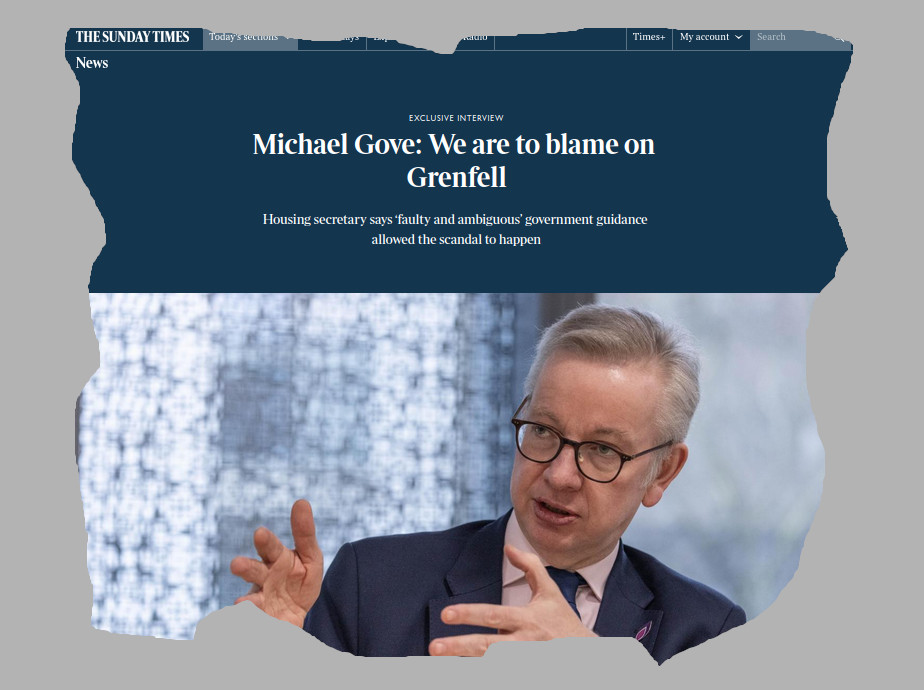
Michael Gove: We are to blame on Grenfell
Michael Gove raised his son and daughter minutes from Grenfell Tower. Five days after the fire that destroyed the west London high rise, he returned, walking around its blackened husk. The remains of some of the 72 people who were killed, 18 of them children, were still inside.
Michael Gove vows to scrap ‘feudal’ leasehold system this year
Michael Gove has pledged to bring forward laws to scrap most “feudal” leaseholds in England this year. Ministers are preparing to ditch rules that bar flat owners from buying the freehold to their property if a small part of their building is given over to commercial use, such as shops.
Will Gove’s leasehold plan make it easier to buy freehold?
Gove has said: ‘In crude terms, if you buy a flat that should be yours’ Proposals could make it easier for leaseholders to buy the freehold If they do so they could set their own ground rents and grant long leases Michael Gove has announced that the Government is planning to scrap leasehold laws that prevent some flat owners from buying their freehold of their properties.
Property developers told to commit to £2bn UK repair scheme
The UK has given property developers six weeks to sign up to an industry-funded £2bn repair scheme aimed at protecting thousands of tenants in England in the wake of the Grenfell Tower blaze or face “significant consequences”.
By Martin Boyd
In an interview for today’s Sunday Times housing secretary Micheal Gove has finally accepted that faulty regulations were one of the contributory factors in the building safety crisis.
There is also a statement to Parliament here
Sun shines on the leaseholders’ demo at Parliament: after Jenrick, is this a new dawn?
His argument is that weak regulations allowed unscrupulous operators to exploit the system. Although he did not name names the most egregious insulation and cladding producers have been mentioned throughout the Grenfell Inquiry.
This fundamental change of stance on behalf of the government highlights the flawed position put forward by the Housing department in the five and half years since the Grenfell tragedy.
Until now Ministers and officials have repeatedly claimed regulations were not at fault. The government’s supposedly independent expert panel spent years seeking to place the blame on everyone and everything except faulty regulations. Their role is now almost entirely discredited by the Gove announcement today.

Mr Gove’s statement also seems to run counter to a number of the submissions made to the Grenfell Inquiry by the officials who oversaw the regulations. Submissions made clear that officials felt that they did not need to accept the recommendations of the coroner in the 2009 Lakanal House fire in Camberwell, south east London, or the many requests from the All Party Parliamentary Group on Fire Rescue and Safety, which was headed by murdered MP Sir David Amess and is served as secretariat by former fire chief Ronnie King OBE.
Had the government accepted the position that Mr Gove now accepts much of the Grenfell fallout could have been very different. We would not have had hundreds of thousands of residents and leaseholders suffering for years worried about safety and costs. More important, the Grenfell families would not have had to wait so long for a minister to accept that the tragedy was in part government’s fault.
For six years, we have had a standoff with the housing sector refusing to accept many failings were their fault, but knowing full well that they had made serious mistakes, with the government asserting that its hands were clean: that the sector was at fault and that failures were nothing to do with officialdom.
In the early days after Grenfell, the developers met the late housing secretary James Brokenshire who argued that they should take responsibility for the repairs to their buildings. Some told the government to go away in very forceful language.
LKP first sat in front of officials in November 2017 warning that the cladding crisis would spiral out of control if they didn’t act quickly. It is an utter tragedy that officials seemed to be more concerned about the blame not being put on the department than they were in solving the problems.
We have been through successive waves of leaseholder voluntary cladding groups – helped by LKP and the National Leasehold Campaign – and it is largely due to the leaseholders’ own efforts that under Mr Gove major changes were made to the Building Safety Act.
If the department had not insisted in 2017 that justice must be allowed to follow its course – which meant waiting for the landlords to take leaseholders to court (the property tribunal) to establish that the law made them liable for the full remediation costs, things could have moved more quickly.
If they had not spent years drafting legislation to ensure leaseholders would be made liable for all historic costs things could have been so different. If there had been a proper grown-up conversation with the housebuilders things would have been very different.
Its also been a tragedy that from the day Dame Judith Hackitt, former chair of the Health and Safety Executive, was appointed to lead the building safety review she was advised that she was guided not to consider the legal tenure and rules under which residential blocks of flats operate. She was advised that leasehold was not relevant to her consideration. It always was, and still is.
We end up in the ridiculous position where:
Hackitt argues residents should be at the heart of building safety, but ended up without a single representative of the leasehold residents – who pay for everything in these blocks – being part of any of her working groups.
We have the very first statutory Health and Safety Executive residents’ panel meeting without a single member of the main leaseholder cladding groups and we have the Welsh Government’s key stakeholder group filled with suppliers, regulators and everyone else … except the representatives of the Welsh leaseholder cladding groups.
We end up with a number of suppliers who see the building safety crisis as a way to make money, whether it be the construction industry led plan for a building safety manager, or the companies now suddenly expert in assessing fire doors or the waking watch consultancy run by a member of the government “independent” expert panel.
It is also unfortunate that there have been those who thought a simple solution might work and who also failed to understand the omnipresent impact of leasehold law and flawed regulations.
The forced loan scheme failed, the design to simply allocate fault failed, the scheme to make the lenders provide finance failed, the warranty schemes have failed.
The levy scheme originally proposed by LKP (thanks to a team headed by ex-Bank of England economist and LKP trustee Dean Buckner, assisted by solicitor Liam Spender and leaseholder Lucy Brown-Cortes) moved forward in two different guises, with both a levy on developer profits and a levy on construction.
Mr Gove’s statement will have a seismic effect on many issues. The developers may be far more willing to sign their agreements to help fix their buildings and move on now that the government accepts everything was not entirely the developers’ fault.
Standards have been raised and will rise further as the new regulatory system becomes live.
All developers know they work on a level playing field rather than one that allows very varying interpretations of corner-cutting and of deciding what was, and was not allowed. The issue of “proportionality” on existing stock will take time to develop, but can at least do so without pretending that previous regulations worked.
What we do not know yet is what the government contract that the developers are required to sign will say. The option of withholding planning permission for anyone who refuses to sign the remediation contract is something LKP has called for from the start. If companies refuse to remediate their buildings, why on earth should they be allowed to build more?
What happens after the developers sign will get more complex.
Not all buildings can be remediated immediately. There will be arguments over what should and should not be corrected under the contract.
We are already hearing stories of some developers seeking to control the remediation projects being carried out by third party contractors working for the “building owner” (that is, the freehold owning landlord), and of others seeking to limit the level of remediation. In some other jurisdictions, they have considered an independent arbitrator to prevent yet more arguments about what should be done and what might legitimately be considered as betterment.
Two major issues remain.
Those deemed as “unqualified leases”. These are leasehold flat owners who do not benefit from the protections because they own multiple homes.
As a result, someone owning a portfolio of four flats in, say, the North East worth £600,000, with three them being their buy-to-let pension, will have no protections from a number of costs. On the other hand, a leaseholder in London with one flat worth £1 million will benefit.
The concept of deeming a flat “unqualified” or “qualified” in perpetuity depending on its ownership on the 14th February 2022 will inevitably damage the housing market long into the future as the system applies to all future buyers.
The waterfall.
This term was invented by another LKP trustee Liam Spender. This was the government’s idea of layered protections, but the sites that sit at the bottom of the waterfall are those where the leaseholders own the freehold and the developer no longer exists.
They still sit drowning in the potential costs, and the government must do something to support them given that Mr Gove also explained in his interview his plan for the abolition of leasehold, which will be the biggest change in housing law in more than 100 years if it moves forward.





 After seven efforts at reform – with more on the way – Sections 21 and 22 of Landlord and Tenant Act 1985 are still flawed service charge protections
After seven efforts at reform – with more on the way – Sections 21 and 22 of Landlord and Tenant Act 1985 are still flawed service charge protections






















If anyone thinks this dysfunctional Government will pass any major legislation in the two years it has left , especially one as complicated as abolishing leasehold I have a bridge to sell.
“Gove vows to scrap ‘feudal’ leasehold system this year” – headline in The Times. Somewhat misleading as the opening line of the story under the headline is “Michael Gove has pledged to bring forward laws to scrap MOST “feudal” leaseholds in England this year”.
I share your scepticism anyway. Is the bridge leasehold or freehold?
Extract of a newspaper article
“The housing secretary said he wanted to abolish leasehold ownership by the end of this parliament, which is expected to be next year. It would have significant implications for the nearly one in five homes in England – 4.8m of the total – that are leasehold owned” He told Sky News: ” We want to introduce legislation in the final parliamentary session of this calendar year to change the leasehold system. it’s not easy in legal terms because you’ve got a tangle of deals going back hundreds of years – unstitching all of that is difficult – but the fundamental thing is that leasehold is an unfair form of property ownership”
I for one welcome that announcement and totally agree that “leasehold is an unfair form of property ownership” Radical change is long overdue, and It looks like Mr. Gove has just “fired” the starting pistol. I wish him the very best in achieving his objective’s and hope for a speedy outcome
We will write more about the announcements on the leasehold reforms in another article. Or maybe quite a few articles over the next 6 months. I hope you saw the shadow secretary of state making a very supportive speech and nodding her support for the reforms in the debate the yesterday. With all three parties calling for reform its now a matter of when not if and when the reforms happen they will be quite large
I don’t like the use of this word REFORMS. Leasehold is either ABOLISHED or it is not abolished.
Martin,
I listened to the whole statement and the debate that followed. Mr. Gove is an excellent orator and went much further than I had hoped for in terms of planned radical reform. In my opinion he won over all party support, I detected an element of real enthusiasm from the opposition. Rarely have I witnesses the house agreeing on what is such a controversial subject,